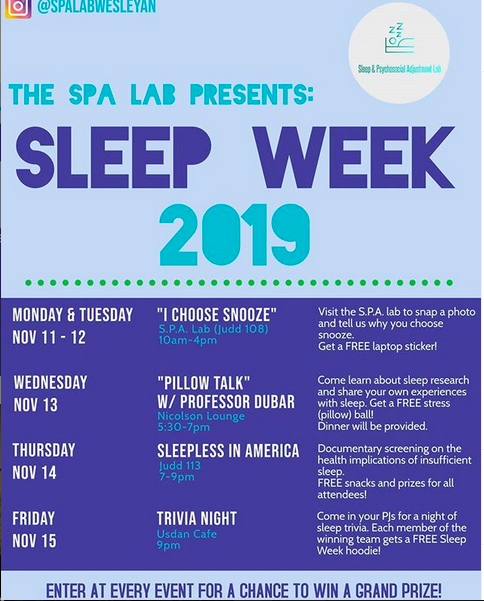
Wesleyan’s Sleep and Psychosocial Adjustment (SPA) Lab will start the second annual Sleep Week event starting on Monday, Nov. 11. Sleep Week consists of four unique events, each focusing on educating and creating a dialogue between the researchers at the SPA Lab and students.
“By creating some of the events that we have, we just wanted to give students the opportunity to know where the lab is and to allow students to be comfortable reaching out,” SPA Lab Director and Assistant Professor of Psychology Royette Tavernier Dubar said. “This is a very welcoming space.”
Some of the scheduled events will include an all-day photo and video campaign on Monday and Tuesday in the SPA Lab, a discussion regarding personal sleep experiences with Dubar on Wednesday, a viewing of the documentary “Sleepless in America” at 7 p.m. on Thursday, and a Usdan Trivia Night on Friday at 9 p.m. Each event has a unique prize ranging from stickers to hoodies.
“One of the reasons that Sleep Week came about was the interest that I received from students who just wanted a space where they could learn more,” Dubar said. “Not just about sleep research but everyday challenges that university students face when it comes to sleep.”
Many students struggle with sleep due to undue stress or pressure. One way Sleep Week attempts to alleviate that stress is by opening up a conversation between SPA Lab researchers and students.
“College life can be very stressful to the extent where it can impair our sleep quality,” SPA Lab research assistant Matiza Sacotingo ’21 wrote in an email to The Argus. “So, to be a part of a week-long event that encourages students to prioritize their sleep, and overall, their physical health but in a manner that is engaging, makes me feel like I’m making a difference, which makes my heart content.”
The SPA Lab’s research primarily revolves around the role that sleep plays in the lives of adolescents and emerging adults. Adolescents’ changing biology and the development of their identities, as well as social media and interpersonal relationships, can have implications on their sleep. This correlation between sleep and other factors in the lives of young people has encouraged Dubar and her team to research more and share their findings.
“In the past, I have examined motivations for alcohol use in relation to sleep,” SPA Lab research assistant Grant Hill ’20 wrote in an email to The Argus. “Last April, Professor Dubar and I, along with former research assistant Tamare V. Adrien [’19], published a study in the journal Sleep Health…which looked at sleep in relation to the fulfillment of basic psychological needs.”
While drugs and social media are linked to sleep, Dubar notes that the body ultimately dictates how much a person should be resting each night. Even when asleep, the body is still functioning and working. Dubar argues that there is no set time for how much sleep an emerging adult should be getting a night.
“Some students, I think, have a number in mind, so they think, ‘I need eight hours,’” Dubar said. “Eight is the golden number, but when they don’t get eight hours, they may get more anxious.”
Researchers in the SPA Lab emphasized collaboration in putting on Sleep Week, both between the researchers and University students and among the researchers themselves.
“All of us in the lab are doing our best to make this annual Sleep Week one to remember,” Sacotingo said.
For the SPA Lab researchers, Sleep Week is a way to educate the student body about an important subject and open up a discussion between curious students and the researchers. Through creating this dialogue, Dubar and her team of researchers aim to construct an interactive and engaging experience that is intended to better every Wesleyan student.
“That is a key aspect of Sleep Week: to have opportunities where students could come in and where we could branch out,” Dubar said. “It is really important to create that bridge where students can feel comfortable jumping into the lab and taking that knowledge we have about sleep research and bringing it to the students.”
Oliver Cope can be reached at ocope@wesleyan.edu.


Leave a Reply